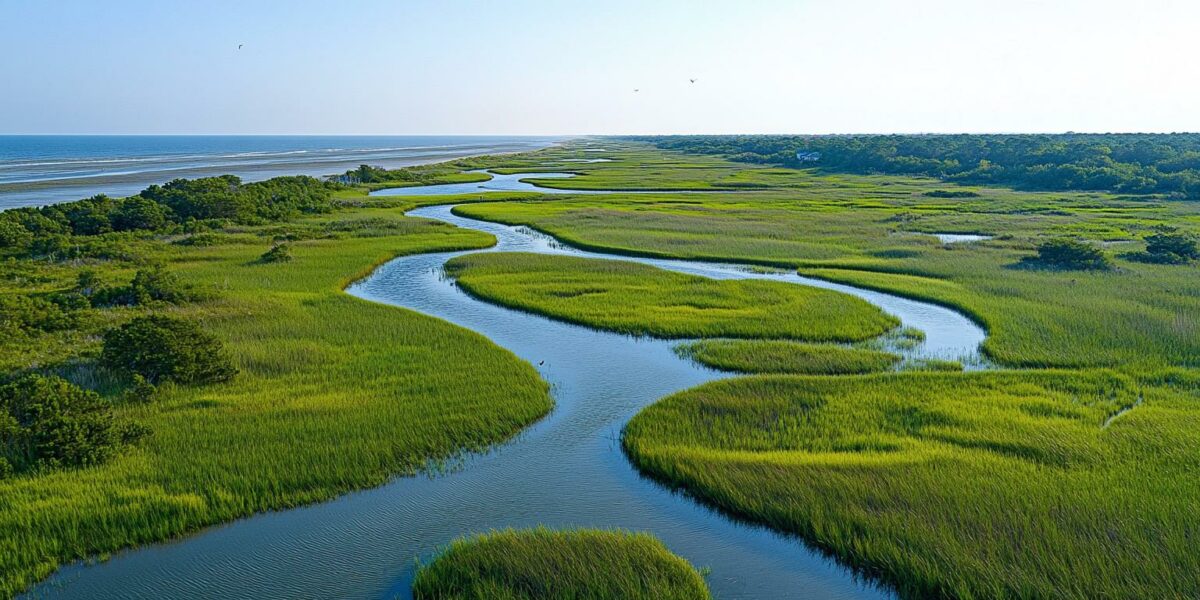The Hidden Carbon Heroes of Essex
In Essex, a groundbreaking initiative launched over two decades ago has emerged as a crucial player in the battle against climate change. At Abbotts Hall on the Blackwater Estuary, strategic breaches in ancient sea walls have given rise to nearly 50 hectares of saltmarsh and intertidal habitats, showcasing nature’s incredible ability to store carbon.
Conservationists are sounding the alarm, emphasizing the need for swift action to protect these vital ecosystems. Adam Nixon, a coastal ranger, highlights that Essex is rich in saltmarshes, but they face significant threats. He points out that 85% of the UK’s saltmarshes have been lost since the mid-1800s, underscoring the urgency of preservation efforts.
Saltmarshes play a pivotal role in carbon sequestration, with estimates suggesting they store around 13 million tonnes of carbon annually. This figure is nearly three times that stored by terrestrial forests, making their protection a priority in the fight against global warming.
The Abbotts Hall project has not only created saltmarshes but also fostered the growth of coastal grasslands and freshwater habitats. These new environments have attracted diverse species of plants and animals, revitalizing the ecosystem.
A Sanctuary for Wildlife
The saltmarshes at Abbotts Hall have become a haven for a wide variety of flora and fauna. The highwater mark is littered with crab shells, and the vibrant green samphire contrasts beautifully with the estuary’s edge. Birds such as red-listed lapwings and little egrets are frequently seen in these restored habitats.
Plant species like sea aster, glasswort, sea lavender, and golden samphire have reclaimed the former fields, while the nationally scarce shrubby sea blite thrives in the raised areas. This rich biodiversity underscores the ecological importance of saltmarsh restoration.
Fish surveys have revealed that the water channels and pools within the saltmarsh support numerous species, including juvenile European bass, grey mullet, and common goby. This highlights the role of saltmarshes in nurturing marine life.
The restored saltmarshes have also become a paradise for birdwatchers, with sightings of marsh harriers, brent geese, shovelers, teal, redshanks, and short-eared owls. The abundance of bird species is a testament to the habitat’s success.
Benefits Beyond Biodiversity
Rachel Langley from the Essex Wildlife Trust emphasizes that saltmarshes are not just about biodiversity; they provide a range of other benefits. Saltmarshes act as natural flood defenses, protecting coastal communities and terrestrial habitats from flooding.
Saltmarshes are incredibly valuable to people, offering one of the last wilderness experiences in the UK. The serene and evocative estuaries, with their changing colors and sounds, provide a unique connection to nature that is hard to find elsewhere.
The estuary’s smells, the seasonal birdlife, and the mysterious underwater ecosystem contribute to the special feeling of standing on a saltmarsh. This sense of connection to nature is a key reason why saltmarshes must be protected.
According to the newly published Blue Carbon Mapping Project, saltmarshes play a crucial role in carbon storage, providing the first comprehensive estimate of carbon stored in UK seabed habitats. This data underscores the importance of conserving these ecosystems.
- Saltmarsh provides a habitat for young fish species.
- They act as natural flood defenses.
- Saltmarshes store significant amounts of carbon.
A Call to Action
Essex’s saltmarshes are under threat, and conservationists are calling for immediate action to protect and restore these vital ecosystems. The Abbotts Hall project serves as a shining example of what can be achieved through managed realignment and habitat restoration.
By preserving and expanding saltmarshes, we can enhance their role in carbon sequestration and biodiversity support. These habitats are essential in our efforts to combat climate change and protect our planet’s future.
The success of the Abbotts Hall initiative demonstrates the potential for similar projects across the UK. As we strive to mitigate the impacts of climate change, the protection of saltmarshes should be a top priority.
Through collaborative efforts and continued research, we can ensure that saltmarshes remain a vital part of our natural landscape, contributing to a healthier and more sustainable environment for generations to come.



lucy
Gr8 read! How can we support more projects like this?
colton
Are there any other benefits of saltmarshes besides carbon storage and biodiversity?
simbaspark
Incredible! But what are the main threats to these saltmarshes?
nora
This is really interesting. How does the carbon storage of saltmarshes compare to rainforests?
dylanwanderlust
Why hasn’t this been more widely publicized? Seems like a big deal!
graysonempyrean
This is amazing news! Go Essex! 😄
BootsSolstice
Is there any way to volunteer for projects like the one at Abbotts Hall?
taylor
Great article! Thanks for shedding light on this important issue.
andrew
This is fascinating! Do other countries have similar initiatives? 🌍
max_wanderer
Wow, I had no idea saltmarshes were so important! How can we help protect them?